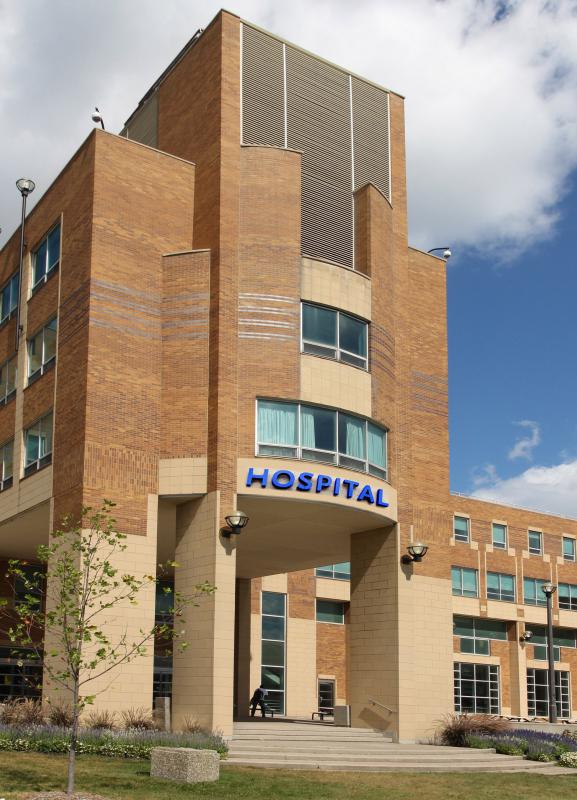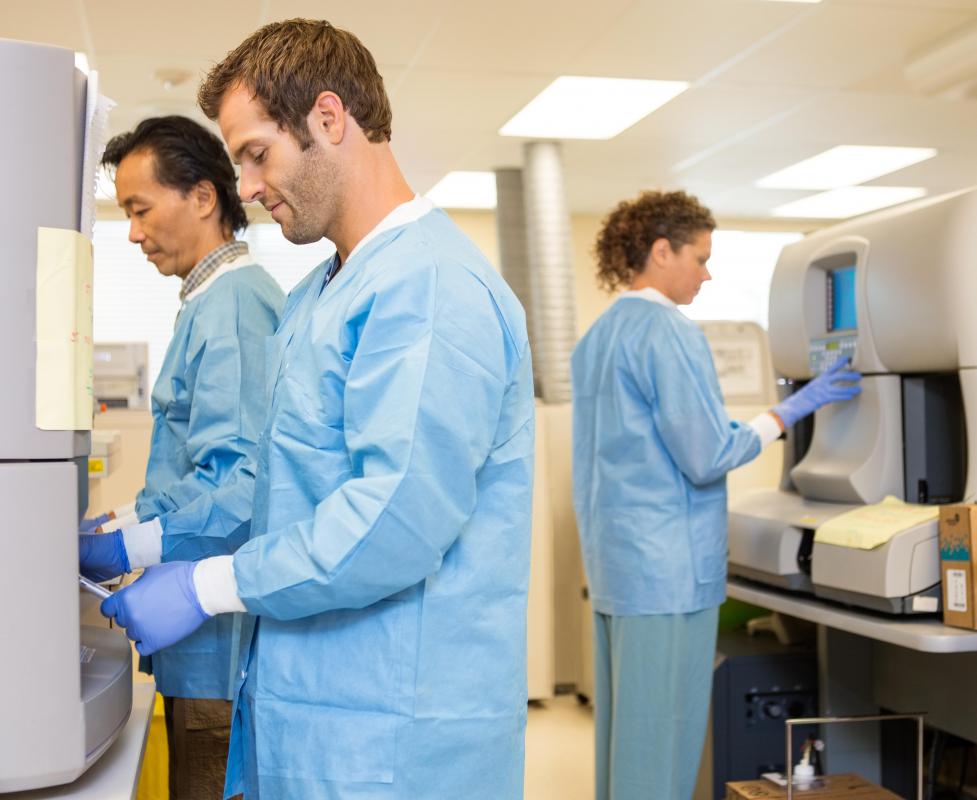At PracticalAdultInsights, we're committed to delivering accurate, trustworthy information. Our expert-authored content is rigorously fact-checked and sourced from credible authorities. Discover how we uphold the highest standards in providing you with reliable knowledge.
What does a Medical Technologist do?
A medical technologist, also known as a clinical laboratory scientist, conducts diagnostic laboratory tests that are important in detecting, analyzing, and treating a wide variety of diseases and medical conditions. Microscopes, chemicals, precision tools, and computer equipment are used by this medical professional to perform tests that give doctors and patients detailed information about various conditions, including the progress and prognosis of the patient. Cytology, hematology, toxicology, parasitology, serology, bacteriology, blood typing, urinalysis, immunochemistry, environmental chemistry, and nuclear medicine are just a few of the many areas where this type of employee would be used.
Hospitals alone request and process millions of laboratory tests each year. The tests are quite important because there is so much information that can be learned about the health of a given patient. For example, with a small sample of about 40 drops of blood, over 20 separate tests can be run at the same time. A few common tests include complete blood count, liver function tests, thyroid function test, renal function test, semen analysis, and routine cultures. Some tests are quite commonplace and others are so specialized that only a few specialized laboratories can conduct them across the globe.

In general, a medical technologist has a baccalaureate degree, but those with a graduate education often receive a higher salary and greater responsibilities. She is often in charge of a laboratory and makes vital decisions about laboratory results. She will also conduct difficult testing procedures, so a comprehensive background in the sciences is essential. Having such a background will allow a technologist to problem solve, interpret, and analyze complex systems. Understanding the scientific theory behind any given test is important, as well.

For this medical professional, evaluating the effects of certain pathological diseases is of the utmost importance. Without knowing how a condition will “show-up” on a test, the test is worthless. Plus, those with the role of supervisor for a laboratory will need to monitor the work of others for accuracy. She must be able to find errors in the test and know how to fix such problems through calibration, assessment, or quality control. She may even be in charge of teaching new test procedures to her fellow technicians.

A medical technologist, called a generalist, is one who is employed in a facility where there is a variety of laboratory testing. She may also specialize and become an expert in a specific area of medicine. Many are employed by research companies, universities, and public health laboratories, while others work as private consultants. Regardless, it is a growing field where there are a variety of job opportunities.
AS FEATURED ON:
AS FEATURED ON:














Discussion Comments
I am a pathologist and work closely with some amazing medical technologists. It is a hidden gem of a profession--working with science and assuring quality in testing is a great responsibility, and new testing technology is always improving. If you like science, and are interested in the medical field, check out a medical technology career! Also, a large majority of the current MT's are nearing retirement, there will be great need for more MT's soon!
One summer when I was in college, I worked in the pathology department at a university hospital. This was my first exposure to working in a medical setting.
In my department, all we did was pass on the information that the medical laboratory technologists provided.
When something was sent to the lab for testing, it usually took 2-3 days before the results came back.
This was a good summer job, but I realized I didn't really like the idea of working in a lab or with pathology slides.
I know this type of work is far from boring for those who are interested in it. I just found that I needed a job that was not as structured and more creative.
Most medical technologists probably feel as at home working in a laboratory all day long as I do when I am working with people as a personal trainer.
I never realized that so many separate tests could be run with just a few drops of blood. It is amazing when you think about how much a couple drops of blood can tell you about your health.
My nephew was always interested both medicine and science. He became a medical lab technologist and works in research.
He absolutely loves his job. He is very smart and is much more comfortable being behind the scenes. For him, working in a lab and interpreting test results is very challenging and fulfilling.
I think knowing that you are working on things that can make a huge difference in the lives of people would be rewarding.
When it comes to research, it seems like it just takes so many years to get to that point. I don't think I would have the patience for it.
I would think with technology changing so rapidly, you would need to stay current on the many different policies and procedures.
This position sounds like it would be more closely related to science than medicine. I am too much of a people person to imagine spending my working days in a lab and looking through a microscope.
Thankfully there are people who enjoy this type of work, because everyone would use their services at some point during their life. I have had blood drawn many times, and have never really thought about all the people behind the scenes who interpret those results.
My daughter is a medical lab technician, and works closely with medical technologists.
Many of her classes, and some of her training was the same as it would be for medical technologist training. She just didn't have to go to school as long or study it in as much depth.
She doesn't make as much as a medical technologist, but also doesn't have the same amount of responsibility.
Her boss, who is a medical technologist, is responsible for the whole lab in the hospital where she works.
I would not want this responsibility, but if you enjoy the fields of medicine and science, I can see how you would be fascinated by it.
@orangey03 – My sister is a medical technologist, and she loves what she does. She enjoys feeling a bit like a detective every day by discovering what is lurking in the samples, and she also enjoys the nice salary.
She makes $50,000, and she is only in her second year at her job. So, she will be eligible for raises in the years to come.
She focused on vocational programs while she was in high school, so if your school offers you any sort of medical training program, take advantage of it. Also, once you get in college, take all the math and science courses that you can, and focus on getting a bachelor's degree in something scientific.
After that, you will need to participate in a medical technologist program. Many universities offer these, and some clinics actually train their staff on site.
I am in high school, and I have always been fascinated with science. I think that a medical technologist career would be ideal for me.
Does anyone know what I need to do to become one? I want to be fully prepared to land a job in this field, so I don't want to just major in biology and hope for the best.
Also, how much can I expect to make as a medical technologist? I hope it's a lot, because the job sounds like it requires a lot of attention to detail.
I would imagine that medical technologist jobs pay pretty well. These people put themselves in a little bit of danger every day, and I would think they would be compensated for that.
Sure, they wear gloves and masks and whatever other protective clothing is necessary to shield them from the biological material they deal with on a daily basis, but accidents can happen. Gloves can rip, and if the technologist has any sort of open wound, even a small scrape, then diseases can enter the body there.
This is one of those professions that I would not want because of safety issues. I know that if they follow protocol, they should be okay, but you never know what can happen.
Post your comments